(2020年整理)人教版新目标八年级下册英语unit1unit5复习资料.doc
英语人教版新目标八年级下册知识整理Unit5

【英语】八年级下册教材全梳理(Unit5 If you go to the party you’ll have a great time)知识·巧学生词巧解【词析】音析:字母组合ea读作[]。
义析:a kind of trousers【典句】This pair of jeans is in style.这条牛仔裤很时髦。
【拓展】jeans本身是复数名词,作主语时谓语动词要用复数形式。
take away拿走【词析】形析:take(拿)+away(离开)义析:take sth.from one place to another【典句】Don’t forget to take away your umbrella.别忘了带走你的雨伞。
【拓展】away是副词,当宾语为代词宾格时,一定要放在away的前面。
make a living 谋生【词析】形析:make(做)+a(一种)+living(生活)义析:do sth.for a living【典句】He makes a living as a writer.他靠写作维持生计。
【拓展】使用时,如果说明谋生的手段应在living后加介词by+doing的结构,指“以……为生”。
如:He makes a living by selling books.他以卖书为生。
【词析】音析:a读[],ai读作[e],重音在第二个音节上。
形析:again(又;再次)+st义析:in a direction or course opposite to【典句】We boated against the wind.我们逆风行船。
【拓展】against本身是介词,不能单独作谓语,常和系动词be连用,意为“反对”。
【词析】音析:ch读作[],an读作[],词尾的e不发音。
形析:形近词change(选择)义析:something that happen unusually and luckily【典句】I haven’t had a chance to read my letter.我还没有机会看我的信呢。
人教新目标八年级英语下册Unit5知识点复习练习
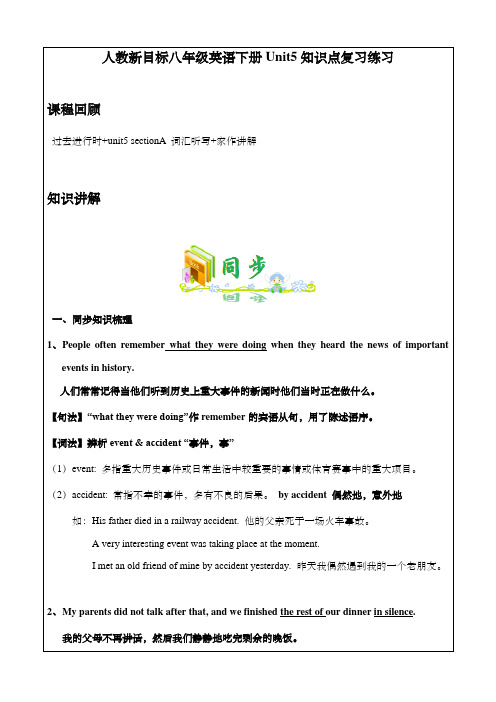
人教新目标八年级英语下册Unit5知识点复习练习课程回顾过去进行时+unit5 sectionA 词汇听写+家作讲解知识讲解一、同步知识梳理1、People often remember what they were doing when they heard the news of importantevents in history.人们常常记得当他们听到历史上重大事件的新闻时他们当时正在做什么。
【句法】“what they were doing”作remember的宾语从句,用了陈述语序。
【词法】辨析event & accident “事件,事”(1)event: 多指重大历史事件或日常生活中较重要的事情或体育赛事中的重大项目。
(2)accident: 常指不幸的事件,多有不良的后果。
by accident 偶然地,意外地如:His father died in a railway accident. 他的父亲死于一场火车事故。
A very interesting event was taking place at the moment.I met an old friend of mine by accident yesterday. 昨天我偶然遇到我的一个老朋友。
2、My parents did not talk after that, and we finished the rest of our dinner in silence.我的父母不再讲话,然后我们静静地吃完剩余的晚饭。
mean to do sth. “打算或企图做某事”如:What do you mean to do with it? 你打算把它怎么处理?What do/did you mean by …? 句型的意思是“你……是什么意思?”如:What do you mean by acting like this? 你这样做是什么意思。
2020年春人教新目标英语八年级下册Unit5-基础知识
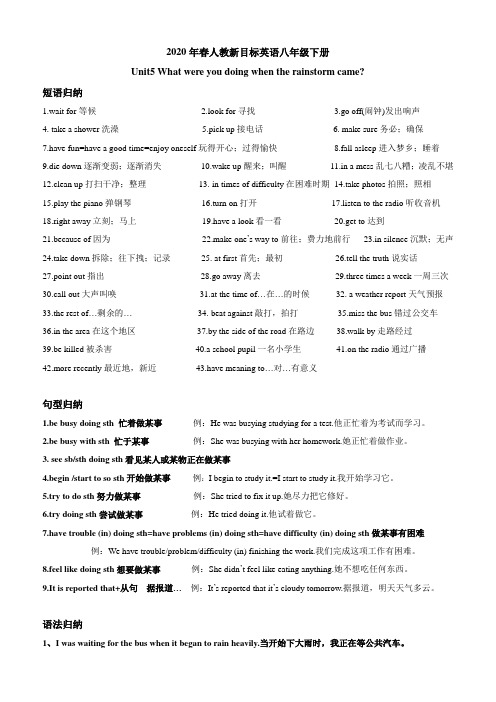
2020年春人教新目标英语八年级下册Unit5 What were you doing when the rainstorm came?短语归纳1.wait for等候2.look for寻找3.go off(闹钟)发出响声4. take a shower洗澡5.pick up接电话6. make sure务必;确保7.have fun=have a good time=enjoy oneself玩得开心;过得愉快8.fall asleep进入梦乡;睡着9.die down逐渐变弱;逐渐消失10.wake up醒来;叫醒11.in a mess乱七八糟;凌乱不堪12.clean up打扫干净;整理13. in times of difficulty在困难时期14.take photos拍照;照相15.play the piano弹钢琴16.turn on打开17.listen to the radio听收音机18.right away立刻;马上19.have a look看一看20.get to达到21.because of因为22.make one’s way to前往;费力地前行23.in silence沉默;无声24.take down拆除;往下拽;记录25. at first首先;最初26.tell the truth说实话27.point out指出28.go away离去29.three times a week一周三次30.call out大声叫唤31.at the time of…在…的时候32. a weather report天气预报33.the rest of…剩余的…34. beat against敲打,拍打35.miss the bus错过公交车36.in the area在这个地区37.by the side of the road在路边38.walk by走路经过39.be killed被杀害40.a school pupil一名小学生41.on the radio通过广播42.more recently最近地,新近43.have meaning to…对…有意义句型归纳1.be busy doing sth 忙着做某事例:He was busying studying for a test.他正忙着为考试而学习。
2020-2021学年人教版八年级英语下册Unit 5单元复习试题(答案)

八年级下Unit 5单元复习试题Ⅰ.选择填空从每题A、B、C、D四个选项中,选出一个最佳答案。
(15分)1.—Hello. this is Mike. May I speak to Nancy?—Sorry, she is taking_________shower. Can I take_______message for her?A./ ;a Ban; / C. the; the D.a ; the2.I was doing my homework when the rain began to beat heavily______________the windows.A.belowB. acrossC.behindD. against3.—What were you doing________________it was raining?—I was rending a book.A.beforeB.whenC. whileD. after4.Mr. Miller fell ill and went to hospital At that time he__________the importance of health.A.imaginedB. wonderedC. realizedD. discussed5.—Why are you all wet?—It rained_______________and I didn't take my umbrellapletelyB.suddenlyC. comfortablyD. differently6. While my father was reading a newspaper, my mother___________a soap opera.A. will watchB. was watchingC. watchesD.is watching7.—Did you see a girl in white pass by just now?—No,Sir, I_____________a newspaperA.readB.was readingC. would readD. am reading8.—Look! The fire is________________.—Let's put more wood on it.A. dying downB. going offC. picking upD. cutting out9. I'm sure we can_______________the game. In my mind, nobody can____________us.A. win; winB.win; beatC. beat; beatD. beat; win,10.My sister doesn't like listening to pop music, because she has trouble____________the words.A.understandB.understandingC.spellD. spelling11.—I heard Frank would join the music club.—_______________ .He's not interested in music at all.A. Why not?B. No problem.C. You’re kiddingD. It' s up to you.12.—Mom, I want to play football.—Sorry. Jack, not now, but you______________play it on weekends.A.canB. have toC. mustD. need13.—I don't know how to tell my parents my decision.—You should tell them the______________,not a lie(谎言).A. situationB.excuseC. reasonD. truth14.—Be quiet and try __________ make any noise. Your brother____________an online class now.—OK,Mom!A.don’t to ;hasB.not to; hasC. not to;is havingD. not ;is having15.I saw the smoke_____________from the house just now.A to rise B.raise C.rising D. raisingⅠ.完形填空阅读短文,从每题A、B、C、D四个选项中,选出一个能填入文章中相应空白处的最佳答案。
Unit 5单元复习-八年级下册单元复习(人教版)
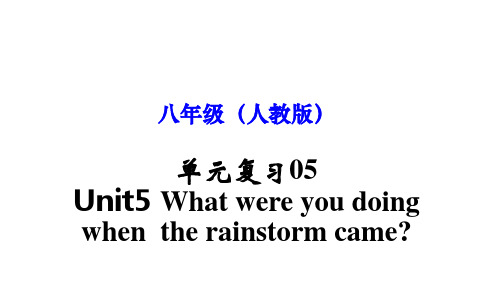
单词过过过
10.Please remember t_o_c_lo_s_e___ (close) the door before leaving. 11.Mike was doing his homework while Katew_as_c_o_o_k_in_g_ (cook) dinner. 12.Many people are against __b_ui_ld_i_n_g_(build) a new zoo in the town. 13.The ground was covered with ___fa_l_le_n__(fall) leaves.
单词过过过
Ⅰ.根据句意及汉语提示写出所缺的单词 1.There was something wrong with my ___al_a_rm___(闹钟), so I got up
late this morning. 2.The sailor found something __st_r_an_g_e__(奇怪的) at the bottom of
(错过公共汽车).
短语过过过
6.当我姐姐正在写作业时,我正在打篮球。 I ___w_a_s _ __p_la_y_in_g_ basketball __w_h_i_le__ my sister ___w_a_s__ __d_o_in_g___ homework.
7.当暴风雨来的时候,他正在回家的路上。 He was on his way home __a_t___ ___th_e___ ___t_im_e__ ___o_f___ the rainstorm.
5.They continued playing soccer on the playground though it was raining ___he_a_v_il_y_(大量地).
2020人教版英语八年级下册单元知识点总结和同步练习 Unit5(无答案)
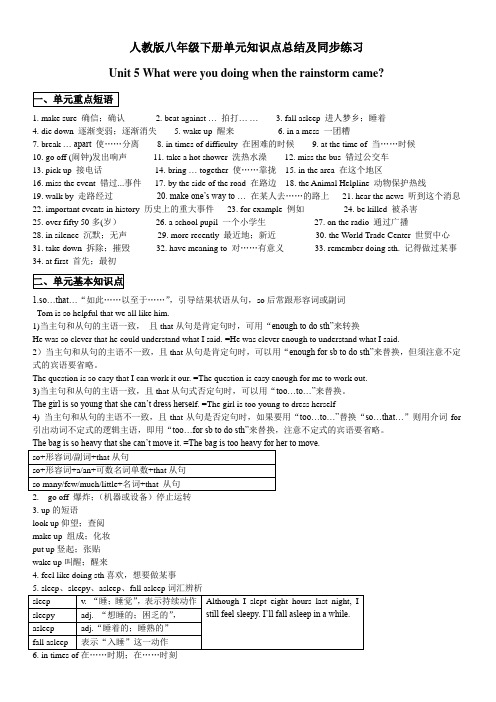
人教版八年级下册单元知识点总结及同步练习Unit 5 What were you doing when the rainstorm came?1. make sure 确信;确认2. beat against …拍打… …3. fall asleep 进人梦乡;睡着4. die down 逐渐变弱;逐渐消失5. wake up 醒来6. in a mess 一团糟7. break … apart 使……分离8. in times of difficulty 在困难的时候9. at the time of 当……时候10. go off (闹钟)发出响声11. take a hot shower 洗热水澡12. miss the bus 错过公交车13. pick up 接电话14. bring … together 使……靠拢15. in the area 在这个地区16. miss the event 错过...事件17. by the side of the road 在路边18. the Animal Helpline 动物保护热线19. walk by 走路经过20. make one’s way to… 在某人去……的路上21. hear the news 听到这个消息22. important events in history 历史上的重大事件23. for example 例如24. be killed 被杀害25. over fifty 50多(岁)26. a school pupil 一个小学生27. on the radio 通过广播28. in silence 沉默;无声29. more recently 最近地;新近30. the World Trade Center 世贸中心31. take down 拆除;摧毁32. have meaning to 对……有意义33. remember doing sth. 记得做过某事34. at first 首先;最初1.so…that…“如此……以至于……”,引导结果状语从句,so后常跟形容词或副词Tom is so helpful that we all like him.1)当主句和从句的主语一致,且that从句是肯定句时,可用“enough to do sth”来转换He was so clever that he could understand what I said. =He was clever enough to understand what I said.2)当主句和从句的主语不一致,且that从句是肯定句时,可以用“enough for sb to do sth”来替换,但须注意不定式的宾语要省略。
最新版本新目标英语八年级下册Unit_1-unit5期中复习重点短语和句子
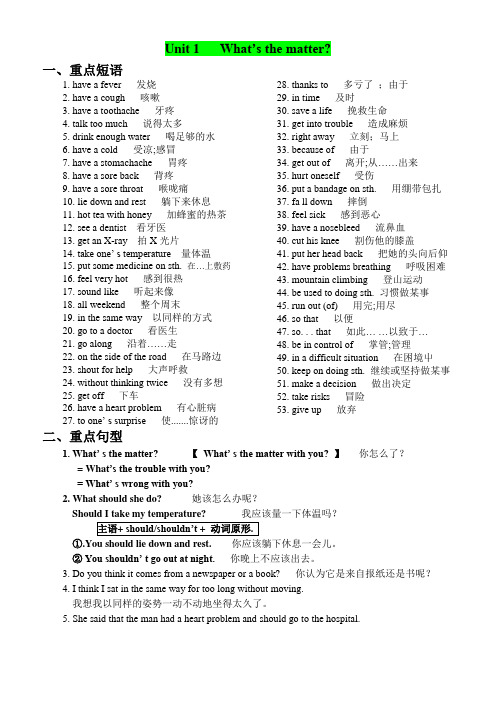
Unit 1 What’s the matter?一、重点短语1. have a fever 发烧2. have a cough 咳嗽3. have a toothache 牙疼4. talk too much 说得太多5. drink enough water 喝足够的水6. have a cold 受凉;感冒7. have a stomachache 胃疼8. have a sore back 背疼9. have a sore throat 喉咙痛10. lie down and rest 躺下来休息11. hot tea with honey 加蜂蜜的热茶12. see a dentist 看牙医13.get an X-ray 拍X光片14. take one‟ s temperature 量体温15. put some medicine on sth. 在…上敷药16. feel very hot 感到很热17. sound like 听起来像18. all weekend 整个周末19. in the same way 以同样的方式20. go to a doctor 看医生21. go along 沿着……走22. on the side of the road 在马路边23. shout for help 大声呼救24. without thinking twice 没有多想25. get off 下车26. have a heart problem 有心脏病27. to one‟ s surprise使.......惊讶的28. thanks to 多亏了;由于29. in time 及时30. save a life 挽救生命31. get into trouble 造成麻烦32. right away 立刻;马上33. because of 由于34. get out of 离开;从……出来35. hurt oneself 受伤36. put a bandage on sth. 用绷带包扎37. fa ll down 摔倒38. feel sick 感到恶心39. have a nosebleed 流鼻血40. cut his knee 割伤他的膝盖41. put her head back 把她的头向后仰42. have problems breathing 呼吸困难43. mountain climbing 登山运动44. be used to doing sth. 习惯做某事45. run out (of) 用完;用尽46. so that 以便47. so. . . that 如此… …以致于…48. be in control of 掌管;管理49. in a difficult situation 在困境屮50. keep on doing sth. 继续或坚持做某事51. make a decision 做出决定52. take risks 冒险53. give up 放弃二、重点句型1. What’ s the matter?【What’ s the matter with you?】你怎么了?= Wha t’s the trouble with you?= What’ s wrong with you?2. What should she do? 她该怎么办呢?Should I take my temperature? 我应该量一下体温吗?①.You should lie down and rest. 你应该躺下休息一会儿。
2020年春人教新目标英语八年级下册Unit-5 第1-2课时知识点
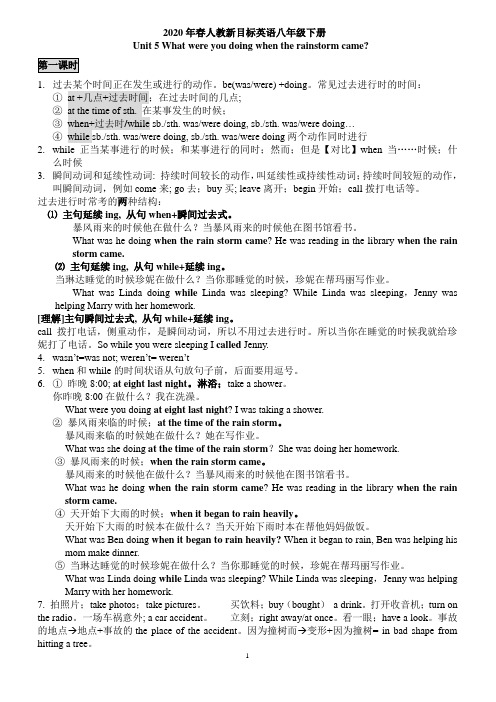
2020年春人教新目标英语八年级下册Unit 5 What were you doing when the rainstorm came?1.过去某个时间正在发生或进行的动作。
be(was/were) +doing。
常见过去进行时的时间:①at +几点+过去时间;在过去时间的几点;②at the time of sth. 在某事发生的时候;③when+过去时/while sb./sth. was/were doing, sb./sth. was/were doing…④while sb./sth. was/were doing, sb./sth. was/were doing两个动作同时进行2.while 正当某事进行的时候;和某事进行的同时;然而;但是【对比】when 当……时候;什么时候3.瞬间动词和延续性动词: 持续时间较长的动作,叫延续性或持续性动词;持续时间较短的动作,叫瞬间动词,例如come来; go去;buy买; leave离开;begin开始;call拨打电话等。
过去进行时常考的两种结构:⑴主句延续ing, 从句when+瞬间过去式。
暴风雨来的时候他在做什么?当暴风雨来的时候他在图书馆看书。
What was he doing when the rain storm came? He was reading in the library when the rain storm came.⑵主句延续ing, 从句while+延续ing。
当琳达睡觉的时候珍妮在做什么?当你那睡觉的时候,珍妮在帮玛丽写作业。
What was Linda doing while Linda was sleeping? While Linda was sleeping,Jenny was helping Marry with her homework.[理解]主句瞬间过去式, 从句while+延续ing。
call拨打电话,侧重动作,是瞬间动词,所以不用过去进行时。
- 1、下载文档前请自行甄别文档内容的完整性,平台不提供额外的编辑、内容补充、找答案等附加服务。
- 2、"仅部分预览"的文档,不可在线预览部分如存在完整性等问题,可反馈申请退款(可完整预览的文档不适用该条件!)。
- 3、如文档侵犯您的权益,请联系客服反馈,我们会尽快为您处理(人工客服工作时间:9:00-18:30)。
希望教育人教版新目标八年级下册英语unit1-5复习资料U nit1 What’s the matter?动词短语:get an X-ray 照X光see a dentist看牙医= go to a dentisttake one’s temperature量体温put some medicine on it 上药take breaks= take a break = have a rest 休息一下lie down躺下go to a doctor看医生in the same way以同样的方式hurt oneself伤着自己to one’s surprise另某人吃惊的是get into trouble 陷入困境,惹麻烦fall down倒塌,跌倒look up 查阅,查字典write down 写下,记下in a dangerous situation在危险的情况下by oneself 独自,亲自cut off切断climb down爬下询问某人的健康问题以及遇到了何种麻烦时,常用以下几种结构来表达:提建议:should do / shouldn’t do应该/不应该干某事What’s the matter (with sb)? / What’s wrong (with sb)? / What happened (to sb)? What’s the trouble (with sb)? / What’s the problem (with sb)? / Are you OK?/Is there anything wrong with sb?表达身体疼痛或不舒服:sb have / has a fever ( cold, cough, the flu)sb have / has a..—ache( headache, toothache, stomachache, backache, an earache)sb have/ has a sore throat (back, arm , foot ,eye s)There i s something wrong with one’s +身体部位I don’t feel well.(这里的well是形容词,健康的)Let’s +动词原形./ What (How) about doing sth ? / Why not ( Why don’t you ) do? You’d better do / You’d better not do 最好干某事/最好不要干某事too much + 不可数名词:too much homework 动词+too much : talk too muchtoo many+可数名词复数:too many students much too + adj/ adv : much too tiredhot tea with honey 加蜂蜜的热茶(这里的with是后置定语,修饰tea)away from :远离Stay away from fire.远离火A地离B地的具体距离具体的距离+away from : My home is 500 meters away from my school.Far from:A地离B地很远My home is far from my school.(具体多远不知道)lie 动词,躺、位于,过去式lay , 过去分词lain, 现在分词lying动词,说谎,过去式lied, 过去分词lied, 现在分词lying名词,谎言tell a lie = tell lies说谎lay 动词,下蛋,产卵,放置,过去式laid, 过去分词laid, 现在分词layingsee sb doing sth看见某人正在干某事see sb do sth看见某人干某事的全过程shout for help 大声呼救shout at sb对某人大喊大叫shout to sb对某人大声说话without thinking twice毫不犹豫,不假思索get on 上车get off 下车(大型交通工具)get into / get out of (电梯、出租车等小型交通工具)expect sb to do sth期待某人干某事expect sb not to do sth期待某人不要干某事agree to do sth同意干某事thanks to 多亏了,幸亏= because of = with the help ofin time 及时on time 按时,准时right away=right now = at once立即马上think of想起,认为think about 考虑think about doing sth考虑干某事think over 仔细考虑hit sb in / on +身体部位(软的部位用in,硬的部位用on)run it under water用水冲洗put a bandage on it 用绷带包扎Knives are used to cut things.have trouble (in) doing sth = have problems/difficulty (in) doing sth干某事有麻烦/问题/ 困难have trouble with sth= have problems with sth = have difficulty with sth在某方面有困难be / get used to doing sth 习惯于干某事I am used to getting up early.我习惯了早起used to do sth过去常常干某事(暗示现在不干了)I used to get up early. (暗示现在不早起)be used to do sth被用来干某事(是由use sth to do sth变为被动语态而来)take a risk = take risks 冒险risk用作动词:risk + n / 代/ doing sth Eg: I am willing to risk losing everything. run out 用完,耗尽,物作主语, 即sth run out: My money ran out soon.run out of 用完,耗尽,=use up 人作主语,即sb run out of sth: I ran out of my money soon.be ready to do sth = get ready to do sth准备好干某事be ready for sth = get ready for sth为…做好准备the importance of +n/代/doing sth …的重要性the importance of water 水的重要性the importance of reading books 读书的重要性make decisions作决定make decisions to do sth作决定干某事= decide to do sthbe in control of掌管,管理You should be in control of your own life.be out of control失去控制the same as和…一样die 动词,died过去式dying现在分词,可作形容词,垂死的dead形容词,死亡的, death 名词,死亡keep on doing sth坚持干某事give up 动副短语,代词放中间,用宾格:give it / them up give up doing sth放弃干某事= stop doing sthU nit 2 I’ll help to clean up the city parks.动词短语:1.动词+介词:look at, listen to, look after( to, at, in , after, for, of, from, across,with, through)2.动词+副词:pick up, take out, give away( on, off, up , down, out, away, )代词作宾语,放中间,用宾格。
3.动词+名词+介词:take care of , take part in4.系动词+形容词+介词:be angry with,be different from5.动词+副词+介词:look forward to, catch up withput : put on 穿上,上演;put off 推迟,延期;put up举起,张贴,搭建;put down放下put out扑灭,熄灭;put away收起来,收好e: come from来自;come on快点,加油;come in进来;come up with想出,想起come out出来,出版,放映;come over过来,顺便来访7.look: look at看着look after照看,照顾; look out当心; look like看起来像; look up查阅look forward to期待,盼望8.turn: turn on 打开; turn off关掉; turn up声音调大点; turn down 声音调小点;9.cut: cut up 切碎;cut down砍伐;cut off切断;cut into切成10.take: take after 相像; take off脱下,起飞; take part in参加; take care of照顾,照料take out拿出,取出11.clean up 打扫干净; cheer up 振作起来,使高兴起来; set up 建立;12.help out帮助解决难题; work out解答出来,计算出,效果好;give out = hand out 分发,散发; try out试验,参加…的选拔;13. dress up 打扮,乔装打扮make up 编造; give up放弃call up=ring up打电话pick up捡起,开车接某人, grow up 长大; 14.give away赠送; put off doing sth推迟干某事come up with = think up 想出put up signs张贴标语clean-up 名词清洁catch up with追上,赶上raise money筹集资金raise money for为…筹集资金in one’s free time在某人的空闲时间fix up 修理,装饰give in屈服answer the telephone 接电话be excited about 对…感到激动、兴奋used to do sth过去常常干某事(暗示现在不干了)I used to play basketball after school.I didn’t use to play basket ball after school. 或I usedn’t to play basketball after school.一般疑问句:Did you use to play basketball after school. 或Used you to play basketball after school.Yes, I did. / No, I didn’t. 或Yes, I used./ No, I usedn’t.特殊疑问句:What did you use to do? 或What used you to do?used to be过去是(现在不是了)I used to be a student. (现在不是学生了)care for 照顾,照料,用于肯定句= look after= take care of非常喜欢,用于否定句I don’t care for green tea.lonely& alonelonely 形容词,孤独的,寂寞的,荒凉的,有强烈的感情色彩,可作表语,如:I feel lonely. 可作定语, a lonely island一座孤岛alone 副词,修饰动词,如:live alone独自生活;也可以用作形容词,但只能作表语,无感情色彩,强调独自,一个人,如:I was alone at home.so &suchso强调形容词或副词,such强调名词such + a/an+ adj + 可数名词单数:such a clever boy= the boy is so clevera feeling of satisfaction 一种满足感satisfaction名词,满足,满意;satisfy动词satisfy sb使某人满意My answer didn’t satisfy her.satisfied形容词,满意的be satisfied with对…满意I am satisfied with your gift.the owner of …的主人:Who is the owner of this car?at the age of …=when sb was …years oldI could write at the age of five. = I could write when I was five years old.try out for参加...的选拔Fifty boys came to try out for the basketball team.try out试验They are trying out a new teaching method.他们正在试验新的教学方法。
